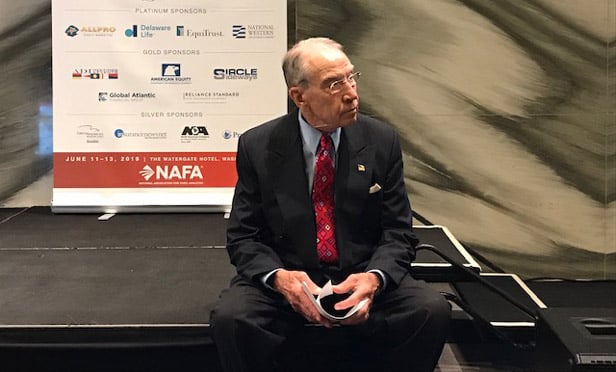 Sen. Chuck Grassley, R-Iowa, before speaking at a NAFA meeting. (Photo: Melanie Waddell/ALM)
Sen. Chuck Grassley, R-Iowa, before speaking at a NAFA meeting. (Photo: Melanie Waddell/ALM)
Senate Finance Committee Chairman Sen. Chuck Grassley, R-Iowa, said Wednesday that the Senate is now working to pass the Setting Every Community Up for Retirement Enhancement (Secure) Act of 2019, “as the House passed it,” but the timeline on passage is uncertain.
At an event held by the National Association for Fixed Annuities at The Watergate Hotel in Washington, Grassley told annuity-industry officials before they headed to Capitol Hill for their annual lobbying day that retirement policy was a top priority for his committee's multi-pronged agenda for the 116th Congress. Other issues include prescription drug pricing, implementation of the new tax law and international trade negotiations.
“Your visit couldn't come at a better time,” Grassley told attendees, noting the full House's May 23 passage of the Secure Act, which is based on the Retirement Enhancement Savings Act, or RESA, a bill that came out of the Senate Finance Committee. “Right now, we're working to pass the Secure Act as the House passed it and send it to the president,” Grassley said.
When asked by the reporter for BenefitsPRO's sister site ThinkAdvisor after his remarks on the timing of the Senate passing the Secure Act, Grassley said, “I wish I could give it to you.”
Grassley indicated that part of the holdup in passage is the provision allowing 529 account funds to be used for homeschooling, private elementary and high school expenses and special needs students.
“I've had meetings with Republicans on the committee,” he told ThinkAdvisor. “I have listened to their concerns, they boil down to something that was in the House bill that [Speaker Nancy] Pelosi made them take it out, even though it had bipartisan support — 529s for homeschooling. It's not really a retirement issue, but it was in there, so there's some people in the Senate that want that included. But I don't think we got 60 votes included. It happens that I support the provision, but it's not really possible to move it along and I'm not going to let something go down the drain as important as RESA is over one issue.”
Another reason that timing on passage remains uncertain, Grassley said, is that “some people think you shouldn't do anything this important by unanimous consent, but of course you know [Senate Majority Leader Mitch] McConnell wants to move along things.”
Grassley then explained that the timing hinges on three possibilities.
“One is unanimous consent, but we have to then take care of these people that are holding it up now … because they want these amendments added or they want regular order. The ideal thing is to get these people off of their hold and pass it by unanimous consent,” he said.
The second option is “if we could get a very short debate and amendment process, that would be OK. But I don't think you're going to get a short one and McConnell's not going to bring it up under those conditions.”
If those two are not doable, the third option, Grassley said, is to attach the Secure Act bill to another piece of legislation. “This is such an important piece of legislation, if we have to wait and get it into some must-pass piece of legislation, then that's where it'll have to go.”
But “you'd be talking months [before passage] if you're talking about the third” option.
READ MORE:
What the SECURE Act means for annuities in 401(k)s
Even with Open MEPs, state-run IRAs, millions still without retirement plans
SECURE Act not clear on whether providers could sponsor Open MEPs
© 2025 ALM Global, LLC, All Rights Reserved. Request academic re-use from www.copyright.com. All other uses, submit a request to [email protected]. For more information visit Asset & Logo Licensing.







